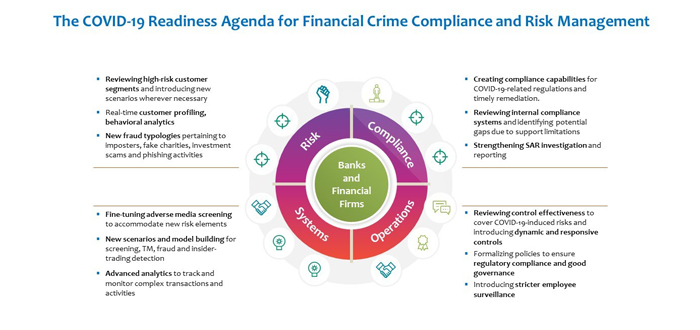
Financial crime risk management in financial institutions (FIs) has undergone big changes due to paradigm shifts in business dynamics, emerging threats, regulatory climate and technological advancements. However, in the last few months, the world has been experiencing something unprecedented that has made all other changes somewhat secondary: COVID-19. This once-in-a-lifetime phenomenon will change the face of risk management and compliance forever. This article will examine the far-reaching impacts of COVID-19 on financial crime and how FIs can address them.
Increased Cyber Fraud
Money transfers through online wallets and online payments, including e-commerce transactions, were used moderately in the past. However, these have now become one of the only ways to conduct transactions due to social distancing measures. Seizing this opportunity, fraudsters equipped with the latest technology are perpetrating more sophisticated online transaction frauds. Because a large part of the global population is not tech-savvy enough to ward off the risks associated with online transactions, they are becoming victims of social engineering and cyber frauds.
Proliferation of Money Mule-Induced Laundering
COVID-19 is going to trigger many small-value fund transfers from various government bodies, nongovernmental organizations and other agencies to fund relief work. Therefore, transaction patterns may stray from the norm. Any transaction monitoring (TM) system will need some time to get tuned to these patterns, and this time will ironically present a golden opportunity for launderers to route funds through money mules and escape detection. Fear of being laid off and the lure of earning income from home will entice people into becoming money mules. Most of the leading regulators, including the FBI,1 have warned FIs to be vigilant about any such situation.
Imposter Scams
A pandemic of this magnitude brings panic and anxiety among the masses, which in turn presents an opportunity for imposters to design scams impersonating government agencies, international relief organizations or healthcare service providers. One such scam that is already occurring involves banks’ moratorium on equated monthly installments. Borrowers are being contacted by scammers over the phone or by email and being asked to reschedule a loan as a relief measure. This allows scammers to extract account details and siphon off funds in no time.
Money Laundering Camouflaged as COVID-19 Relief
While the world adapts to fight the pandemic, launderers are using this time to transfer illicit funds under minimal or no suspicion. Regulators such as the European Banking Authority (EBA)2 have already warned banks about emerging criminal activity linked to COVID-19.
As stated by the EBA, “As most economies are facing a downturn, financial flows are likely to diminish. However, experience from past crises suggests that in many cases, illicit finance will continue to flow.”3 Other major regulators have also released similar COVID-19 guidelines. It is incumbent for cash-starved banks to maintain high levels of rigor while monitoring cash transactions.
COVID-19-Related Insider Trading
The current crisis has impaired the business dynamics that drive economic activities in a normal scenario. Only essential businesses are open under strict regulatory control. As a result, government policies and decisions carry huge implications on trading prices of stocks and if used scrupulously, can lead to market abuse.
For example, any announcement granting permission of testing facilities to diagnose companies will have implications on the companies’ stock prices. This material nonpublic information is prone to be misused to gain undue advantage in the stock markets. As mentioned by the Securities and Exchange Commission,4 “Corporate insiders are regularly learning new material nonpublic information that may hold even greater value than under normal circumstances…. a greater number of people may have access to it than in less challenging times.” Therefore, it is warranted for FIs to deploy strict transaction and communications surveillance to safeguard market integrity.
Cybercrime and Associated Cryptothreats
There are reports of cybercriminals taking advantage of COVID-19 to scam the vulnerable public. Some examples include the following:
- Healthcare providers being attacked by ransomware such as Bitcoin ransomware “Ryuk,” which is wreaking havoc on the already stressed hospital information technology (IT) infrastructure and cashing in on the pandemic.
- Cyberattacks on the depleted security systems of organizations due to limited staff presence and unpatched vulnerabilities.
- Launching fake mobile apps, which claim to be providing information on COVID-19, aimed at stealing personal data or even rendering phones unbootable.
All the above developments have two things in common: fear and chaos caused by the pandemic. This has provided the perfect platform for launderers and fraudsters to thrive until FIs develop a defense mechanism and adaptations become institutionalized. FIs must quickly improvise to this changed scenario to avoid further damage.
Managing the Impact of COVID-19: A Job Made for FIs
Having understood the gravity of the problem, FIs must now address financial crimes triggered by COVID-19. One silver lining in this grim situation is seeing several innovations develop that were unimaginable just a few weeks ago, such as the production of ventilators by auto manufacturers and the conversion of trains, ships and even airplanes into hospitals. FIs are likely to create their own innovative solutions to stay afloat during these testing times as well. The following are realignments that can be used to mitigate COVID-19-related financial risks.
Strengthening SAR Investigation, Factoring in Emerging Risks and Enhancing Automation
As most client interactions for banking are now happening through online channels, anti-money laundering (AML) procedures will change. The risk perception of banks should also change accordingly as bad actors will introduce newer forms of suspicious activities into the system. The Financial Crimes Enforcement Network5 has already advised FIs to remain alert to malicious/fraudulent transactions from exploiting the pandemic.
Given the above changes and with minimal staff strength at their disposal, banks that have introduced automations in the past will gain from these implementations. Others will need to work hard to introduce cognitive robotic process automation (RPA) based on suspicious activity report (SAR) investigation and reporting solutions to meet this challenge.
Fine-Tuning Adverse Media Screening
As part of AML investigations, adverse media screening is performed to ascertain whether the investigated entity is involved in anything negative such as criminal proceedings, penalties and fines, involvement in laundering of funds, and so on. Important aspects of adverse media screening include news categorization, context-sensitive interpretation and automation of screening process. With COVID-19 introducing new sets of financial crime typologies, FIs will face increased false positive alerts as well as true positive misses. Therefore, FIs need to review their media screening and introduce necessary changes to stay effective. In short, FIs must redefine screening typologies for drawing insights.
New Scenario Building for TM
Like adverse media screening, TM scenarios will also need to be adjusted so newer forms of money laundering are kept in check. Therefore, banks need to review TM scenarios and introduce artificial intelligence (AI)-based detection wherever possible to take care of any new anomalies or pattern changes automatically.
Stricter Insider-Trading Detection Through AI-Based Models
Insider trading as a result of regulatory policy information being leaked must be addressed. Additional scenarios to consider include timing of policy information dissemination and timing of trading. This will be a tough job as it needs to be accomplished in the interest of market integrity. A more rigorous trader and employee communication surveillance will also help a great deal.
Finding Newer Acceptable Ways to Perform KYC Updates
Know your customer (KYC) updates will have serious challenges as social distancing measures continue. FIs need to develop a robust mechanism using unconventional channels wherever possible, such as online data collection for collecting customer data.
Enriching Fraud Scenarios With the Latest Event Information
As newer forms of frauds are gaining prominence, FIs need to enrich their fraud event repository so COVID-19-induced frauds are not missed. Here again, AI-based detection models will be quite handy for making unsupervised adjustments in flawed indicators.
Keeping Cyber Threats at Bay by Deploying Adequate Staff
Cybersecurity and data breach prevention are nonnegotiable under all circumstances. These are now even more critical due to the following factors:
- Stress of digital transaction volumes on IT infrastructure
- Current onslaught of cybercriminals
- Data access by employees working from remote locations
Any frugality in terms of staffing this function will only attract hefty financial and reputational losses and cause severe business continuity issues. Therefore, IT support should receive top staffing priority.
Including the above-mentioned set of measures, the broad readiness agenda for C-level risk and compliance heads of FIs is depicted below.
Conclusion
This pandemic will likely be present for the foreseeable future, so appropriate changes in how businesses manage risks must be made. After getting over the initial hiccups of grappling with immediate business continuity challenges, risk and IT teams of FIs are now gearing up for the next challenges: how to plan, introduce and institutionalize the above-mentioned adaptations that will help them currently and in the long term. As there is less time to react, operational resiliency and managing speed of change is of utmost importance. One thing that will help FIs a great deal is introducing AI-based capabilities, which have very high levels of adaptability to changes in data and information by learning from newer patterns, anomalies and outliers. FIs that already have these capabilities stand to gain a lot and will be better equipped to handle this crisis now and in the future.
However, it is not possible to develop these capabilities overnight if not existing in their current ecosystem. Therefore, it will be prudent to develop a two-pronged strategy comprising of strategic and tactical measures. The following are key elements of this strategy:
- All types of detections can be improved through strategic measures, i.e., either by deploying new AI-based models within a reasonable time or fine-tuning existing models. For example, money laundering or fraud detection models can be retrained with additional data in order to maintain their detection effectiveness.
- Changes in manually performed activities can be handled through remediation in the short term so that compliance objectives are quickly achieved. However, in the long run, they would require measures like RPA to save effort and time as well as meet new compliance requirements.
Regardless of the strategy, it is important to stay compliant at all times as regulators are not going to provide any major leeway during this hour of crisis.
Sunil Kumar, consulting partner and portfolio head, financial crime compliance advisory, TCS, Mumbai, India, sunil.kumar1@tcs.com
- Michael Kosnar, “FBI warns of 'money mule' schemes exploiting COVID-19 pandemic,” NBC News, April 9, 2020, https://www.nbcnews.com/news/us-news/fbi-warns-money-mule-schemes-exploiting-covid-19-pandemic-n1180581
- Ben Poole, “EBA seeking to mitigate financial crime risks during COVID-19,” CTMfile, April 2, 2020, https://ctmfile.com/story/eba-seeking-to-mitigate-financial-crime-risks-during-covid-19
- " EBA statement on actions to mitigate financial crime risks in the COVID-19 pandemic," European Banking Authority, March 31, 2020, file:///C:/Users/d40831837/Downloads/statement-on-actions-to-mitigate-financial-crime-risks-in-the-covid-19-pandemic.pdf
- Michael N. Levy, Richard M. Rosenfeld and Matthew Rossi, “Profiting Off Pandemic: The SEC Issues a Sharp Reminder About Companies’ Obligations Regarding Insider Trading and MNPI,” MAYER|BROWN, March 24, 2020, https://www.covid19.law/2020/03/profiting-off-pandemic-the-sec-issues-a-sharp-reminder-about-companies-obligations-regarding-insider-trading-and-mnpi/
- “FinCEN Issues COVID-19-Related Guidance on SAR Filings, Heightened Risk of Disaster Fraud,” Covington, March 16, 2020, https://www.covfinancialservices.com/2020/03/fincen-issues-covid-19-related-guidance-on-sar-filings-heightened-risk-of-disaster-fraud/











